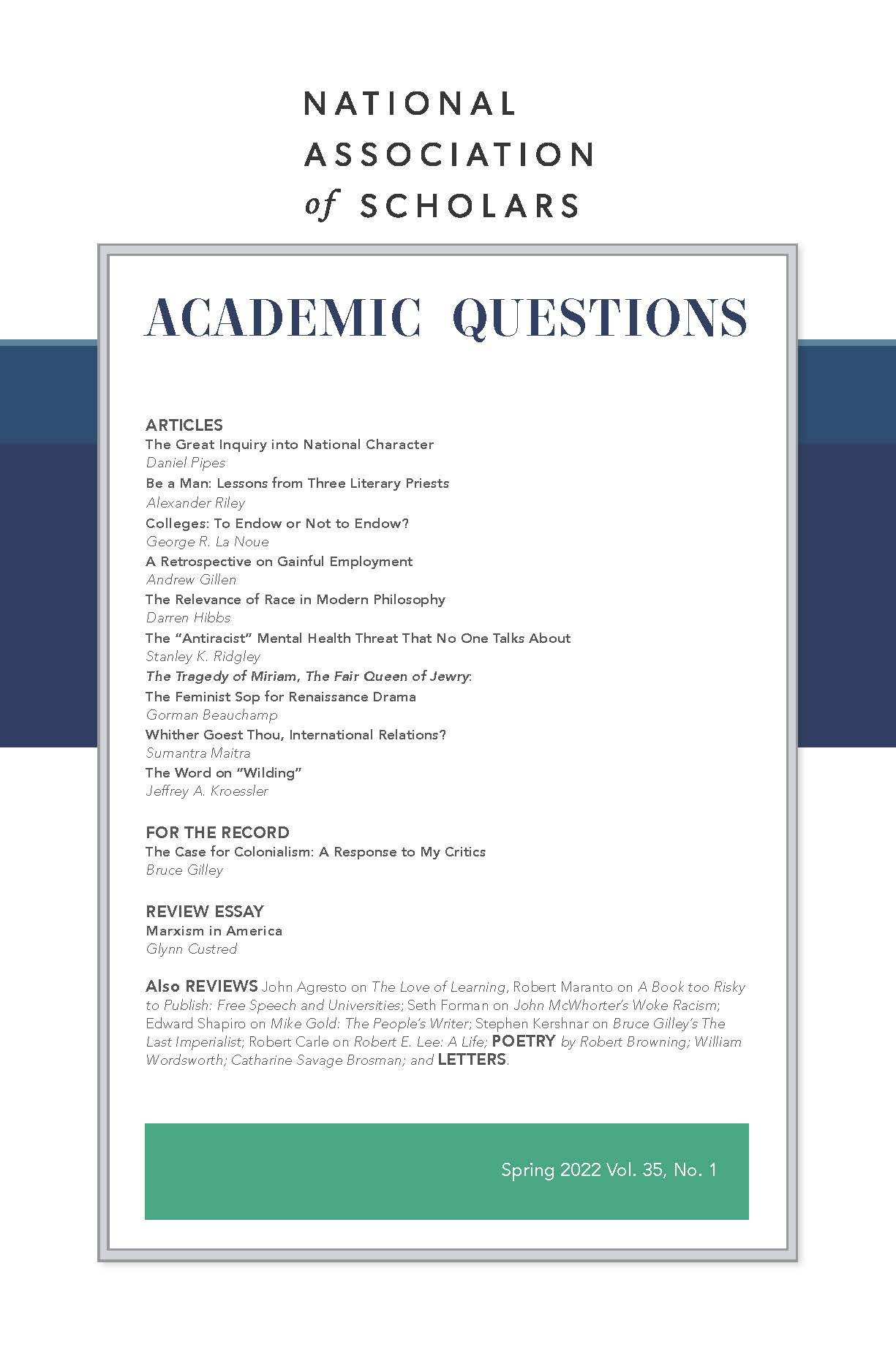The Last Imperialist: Sir Alan Burns’s Epic Defense of the British Empire, Bruce Gilley, 2021, Regnery Gateway, pp. 256, $24.06 hardbound.
Stephen Kershnar is a distinguished teaching professor in the philosophy department at the State University of New York at Fredonia and an attorney; [email protected]. He is the author of nine books, including his latest, Desert Collapses: Why No One Deserves Anything (Taylor and Francis, 2021).
Before discussing the contents of Bruce Gilley, The Last Imperialist: Sir Alan Burns’s Epic Defense of the British Empire, it is worth noting its history. In 2017, Gilley published an article, “The Case for Colonialism,” in Third World Quarterly in an advance online version. Gilley argued that colonialism was good for those who were colonized and that many of the colonialized people accepted it. Critics threatened the journal’s editor, University of London’s Shahid Qadir, with violence. Qadir defended his decision to publish it. He argued that the article had undergone the usual double-blind peer review. Fifteen members of Third World Quarterly’s editorial review board claimed that the article had not undergone proper review and resigned in protest. As a result of the threats, Gilley withdrew the article. The journal then deleted it. He then re-published the article in the National Association of Scholars’ Academic Questions.
Rowman & Littlefield originally agreed to publish this book, but when York University’s Maoist philosophy professor J. Moufawad-Paul put forth a petition opposing publication signed by more than a thousand people, the offer was withdrawn. The signatories argued that the book had a white nationalist perspective and was poorly researched. Gilley responded by noting that the book went through the standard peer-review process and was endorsed by prominent historians Tirthankar Roy, London School of Economics, and Sir Jeremy Black, University of Exeter.
In 2021, the conservative publishing house Regnery Gateway published the book. Gilley’s proponents claim that the article’s retraction and the reversal of the book contract reflect cancel culture. In so doing, they claim, the actions endanger academic freedom and prevent an important debate over whether colonialism was harmful and wrong.
With that background in mind, I should disclose that this is not my general field of expertise. I am a philosopher and lawyer. Nevertheless, Gilley’s book is outstanding. It weaves together the colorful story of one of the great British colonialists, the twentieth century story of European colonialism, and the moral argument for colonialism into an unforgettable book.
Gilley paints a vivid portrait of Alan Burns (1887-1980). He was a British colonial administrator who oversaw a number of British colonial territories, including the Bahamas, Gold Coast (Ghana), Honduras, Leeward Islands (Anguilla, Antigua, Barbuda, Guadeloupe, Montserrat, Nevis, Redonda, Saba, St. Barts, Saint Kitts, Saint Martin, Sint Eustatius, the British Virgin Islands), and Nigeria. Gilley describes how when Burns was in power, he often succeeded in bringing to the people in the British colonies noticeable improvements in health care, orderly government, peace, prosperity, and a surprising amount of economic and political freedom. Burns’s colorful past comes out when Gilley describes his World War I combat against the Germans in the Kamerun Campaign, and how his administrative excellence likely saved his life when British officials removed him from the fighting to put his managerial excellence to good use.
On Gilley’s description, Burns was an effective, sharp, and relentless defender of colonialism. Burns waged an intellectual campaign for colonialism, arguing for it in public forums such as the United Nations (UN), and in his books. Consider, for example, his In Defence of Colonies (1957). Along the way, Burns was also an ostrich-feathered governor of Nigeria, a member of the British delegation to the UN for a decade, and leading scholar on Nigeria.
Burns’s personal story is as intriguing as his administrative stories and intellectual arguments. He was the son of a colonial administrator. He and his family (he had a wife and two daughters) moved frequently and lived much of their life far away from Britain. His extended family mirrored the different views at the time. One brother, Emile Burns, was a leading British Communist who supported many of Alan’s nemeses. Emile trained third world tyrants and consorted with Soviet agents. Another brother, Robert Edward (“Bertie”) Burns was also in the colonial service but was far more conflicted than Alan regarding colonialism. Despite their strong intellectual differences, at the end of their lives, the three brothers socialized at family gatherings, joined by their children and grandchildren.
Burns’s life nicely illustrates the benefits and spread of colonialism as the efficiency of British leadership and universalizing ethics won over the parochial and inefficient world it displaced. Burns lived through the anticolonial rise of national identity and the West’s loss of confidence following World War II that led to the precipitous end of colonial rule. Burns’s prediction that the newly independent countries would suffer catastrophic consequences were sadly vindicated by the brutal events in those countries, especially in the 1970s. Burns’s story is inextricably linked to the story of colonial ascent and descent and consequent suffering of the peoples of those countries. He outlived his wife and brothers and when he died, a “who’s who” of colonial stardom celebrated Burns’s life in London’s Westminster Cathedral. The crowd included knights, ladies, lords, and viscounts.
Burns’s intellectual case for colonialism is surprisingly—and to my mind shockingly—strong. As countries gained independence, they descended into chaos, economic collapse, mass migration, tyranny, and violence. Consider Angola, Burma, Congo, Indonesia, Nigeria, Pakistan, Rwanda, Sudan, Tanzania, Togo, and Uganda. Even India suffered grinding poverty and significant violence following independence. In Burns’s beloved Nigeria, one to two million people were killed or died from starvation in the Biafra War (1967-1970). Later postcolonial catastrophes included Cambodia, Somalia, Sudan, and Vietnam.
Gilley highlights Burns’s fascinating moral argument. Burns argued that countries that remained colonies for longer periods or were more rigorously and comprehensively governed are overwhelmingly more democratic, liberal, peaceful, richer, and to a greater degree governed by the rule of law than those that were colonies for a shorter time or less comprehensively governed. He argued that had Britain not colonized the countries that it did, they would have been colonized by other (and likely less liberal and humane) European powers or suffered from tyrannical dictatorship from the strongest ethnic group in the region.
The case for British colonialism faces two main intellectual objections. First, Great Britain had no right to rule other countries. Second, Britain’s colonial rule caused the descent into poverty, tyranny, and violence. Gilley’s responses—at least in part motivated by Burns’s arguments—are fascinating. In response to the first objection, Gilley responds that the right to self-rule would not have been enjoyed even if Britain did not maintain its colonies. Instead, either (worse) colonial powers or savage ethnic rule would instead have ruled these territories. In response to the second objection, Gilley implicitly responds that colonialism held off rather than caused the chaos and savagery that followed independence and that the eventual benefits of colonialism included greater peace, prosperity, and order than would have been enjoyed otherwise.
One feature of the book that I would like to have seen is a straightforward intellectual statement of Burns’s defense of colonialism and Gilley’s evaluation of it. Gilley is a leading figure on the moral case for colonialism, and he describes in broad outlines Burns’s philosophy of colonialism. But a more direct, itemized evaluation by him of Burns’s positions would have strengthened the book.
That said, this is a wonderful book. It is colorful, interesting, well-written, and intellectually groundbreaking. Sir Alan Burns lived a productive and astonishing life and was at the heart of one of the defining issues of the twentieth century. I am glad I spent some time with this volume and I suspect that you will be too.
Photo by Iñigo De la Maza on Unsplash













